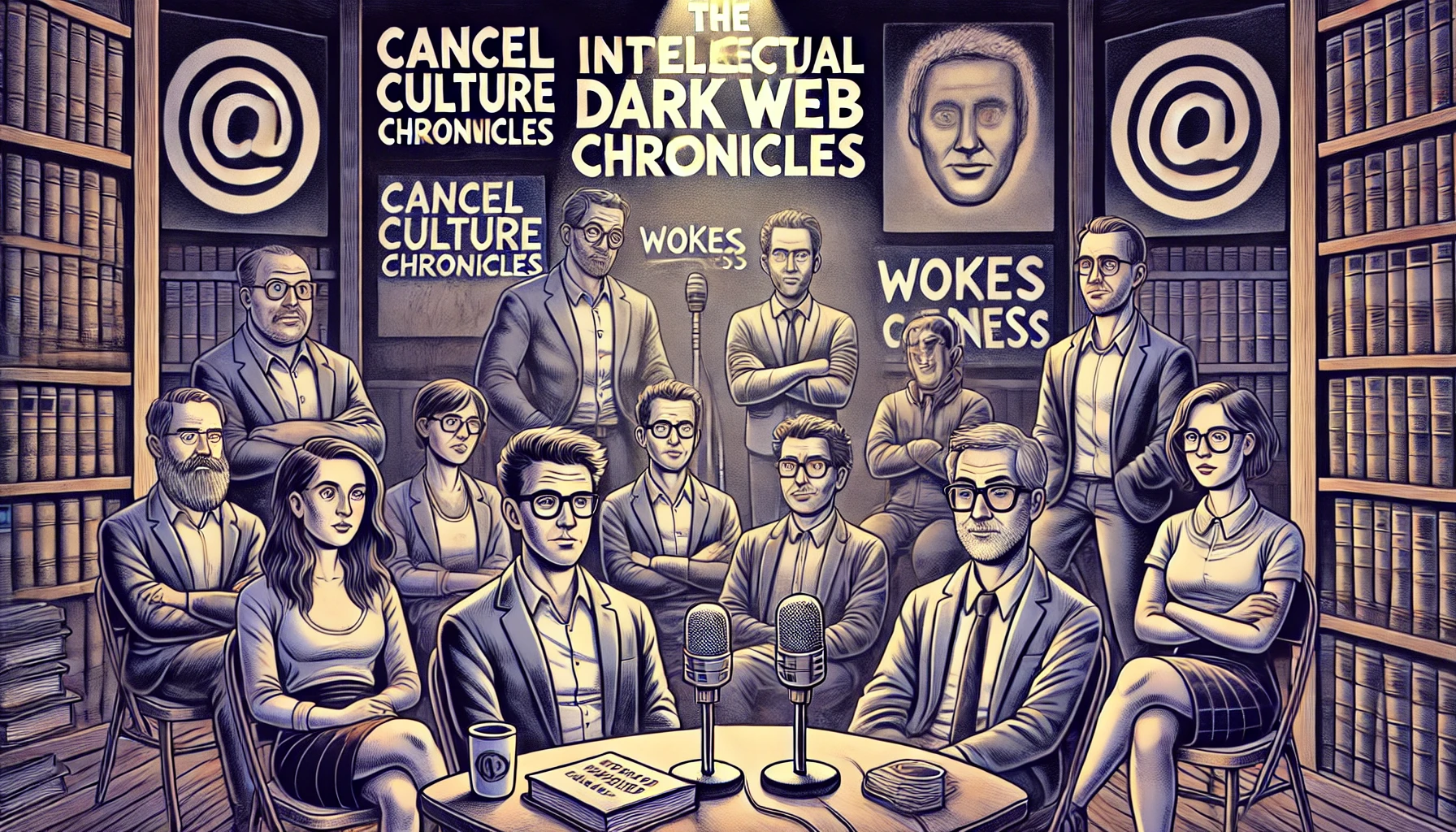The Intellectual Dark Web: A Cringe Retrospective
Remember the Intellectual Dark Web? That ragtag group of “free thinkers,” mavericks, and self-proclaimed truth-seekers who stood as the last bastion of intellectual bravery against… what exactly? Cancel culture? Wokeness? Participation trophies? Oh, the villains were nebulous, but the mission was clear: they were here to save civilization from itself, one smug podcast appearance at a time.
Looking back, the whole thing now feels like a live-action roleplay of contrarianism—equal parts edgy teenager energy and TED Talk sophistication, sprinkled with just enough jargon to make your uncle think he was “finally getting it.” It was like 8th-grade syndrome but with microphones, book deals, and a wardrobe that screamed, “I’ve read Foucault, but only to disagree.”
The Cast of Characters
The Intellectual Dark Web—or IDW for short, because nothing says edgy rebel like an ominous acronym—was a collection of academics, commentators, and thinkers who loved two things: (1) calling themselves brave for having “dangerous ideas,” and (2) selling those dangerous ideas as $24.99 hardcovers.
At its peak, the IDW felt like the Justice League of Hot Takes:
- Jordan Peterson, the Canadian psychologist who somehow turned “clean your room” into a cultural manifesto and “lobsters” into a metaphor for everything from dominance hierarchies to why you should never split the dinner check.
- Ben Shapiro, the rapid-fire debater who proved that speaking fast and saying “facts don’t care about your feelings” enough times could make logic sound like a TEDx Talk at a youth group retreat.
- Sam Harris, who expertly walked the line between “calm voice of reason” and “guy who might ask if you’ve tried DMT.”
- Eric Weinstein, who coined the term “Intellectual Dark Web” and presumably spent the rest of his time Googling himself to see if it caught on.
These people weren’t just thinkers—they were brave. Not like actual bravery, such as whistleblowing against authoritarian regimes or standing up to systemic oppression. No, their bravery involved taking the stage at college auditoriums to say things like, “Men and women are different,” as if this was a revelation on par with discovering fire.
The Cult of Contrarianism
At its core, the IDW wasn’t about intellectual rigor—it was about branding. They weren’t selling ideas; they were selling rebellion. But not the messy, loud kind of rebellion that challenges power structures or shifts paradigms. This was a rebellion for people who wanted to feel edgy without leaving their ergonomic desk chairs.
You weren’t just watching a debate about gender roles or free speech. No, you were participating in a movement. You were part of the resistance! The enemy? College freshmen with green hair and a Tumblr account. And the stakes? The very survival of Western civilization.
If you squinted hard enough—and oh, did they squint—you could see how framing these discussions as “forbidden knowledge” gave them an allure. Who doesn’t want to feel like Neo waking up from the Matrix, except instead of learning kung fu, you’re learning why “identity politics” are the real problem at your office happy hour?
The Self-Congratulatory Bubble
The IDW thrived on an aura of self-importance. You weren’t just listening to podcasts—you were engaging with the most dangerous thinkers of our time! They would name-drop philosophers, throw around terms like “postmodern neo-Marxism,” and spend hours breaking down debates that ultimately boiled down to, “Am I allowed to say this without losing my job?”
In their world, every pushback was proof of their victimhood. A university disinviting them from a speaking event? Censorship. A critic pointing out logical inconsistencies? Evidence of a leftist mob. Twitter banning their burner accounts for sharing conspiracy theories? The death knell of free speech.
It’s like the person who calls themselves an outlaw because they once got a parking ticket. Only in this case, the parking ticket was getting ratioed on Twitter after saying something stupid.
Rebel Edge or Reactionary Cosplay?
Let’s not sugarcoat this: a lot of IDW content aged like a gas station sandwich. Many of their ideas weren’t groundbreaking—they were just regurgitated contrarianism dressed up as profundity. Their fans, meanwhile, lapped it up like an energy drink laced with confirmation bias.
Jordan Peterson’s infamous stance on compelled speech in Canada? Cool, except it turned out Bill C-16 wasn’t forcing anyone to speak a certain way. Ben Shapiro dunking on college students? Less impressive when you realize his biggest intellectual opponents were kids pulling all-nighters before their sociology final.
And Sam Harris? Well, let’s just say that when your big contribution to public discourse is “Hey, maybe Islam is the real problem,” you’re playing on Hard Mode for nuance.
The Merchandising of Misery
Of course, no movement would be complete without monetization. Books, speaking tours, subscription-based content—this wasn’t just an intellectual exercise; it was an industry. The IDW turned “cancel culture” into a cottage industry faster than you could say, “Check out my Patreon.”
This wasn’t about advancing knowledge—it was about leveraging grievances for profit. They weren’t solving problems; they were selling solutions to problems they exaggerated or outright invented. It’s hard to take your rebellion seriously when it’s sponsored by Squarespace and Audible.
When the Lights Dimmed
So what happened to the Intellectual Dark Web? Like most trends that take themselves too seriously, it burned out. The more these self-proclaimed rebels yelled about being silenced, the less relevant they became.
Some drifted into obscurity. Others pivoted to more lucrative outrage topics. And for many, their biggest opponent wasn’t cancel culture—it was irrelevance. You can only cry wolf so many times before people stop listening, and it turns out there’s a limit to how many “woke mobs” your average podcast listener can care about before tuning out.
The Cringe Factor
Looking back, the IDW feels like the intellectual equivalent of wearing a trench coat to high school because you just watched The Matrix. It’s that phase where you’re convinced you’ve unlocked some secret understanding of the world, only to realize years later that, no, you were just really into edge-lord aesthetics and overestimating your own insights.
The same people who thought they were rebels in the IDW now cringe at their own YouTube watch history. It’s the kind of secondhand embarrassment you feel when you find an old Facebook post of yourself saying, “I’m just asking questions,” under a Jordan Peterson clip.
The Legacy of the IDW
Did the IDW leave a lasting mark on society? Sort of. They popularized terms like “cancel culture” and “wokeism,” which continue to dominate online discourse. They also paved the way for a new generation of grifters, each more desperate than the last to find the next big cultural boogeyman.
But in the grand scheme of things, the IDW will be remembered less for its ideas and more for its vibe—a moment in time when a bunch of people convinced themselves they were warriors in the battle for intellectual freedom, only to end up as a punchline.
Lessons Learned
If there’s one takeaway from the rise and fall of the Intellectual Dark Web, it’s this: being loud doesn’t make you brave, and being controversial doesn’t make you right. For every truly groundbreaking thinker out there, there are a dozen wannabe contrarians mistaking smugness for substance.
So the next time someone invites you to join their intellectual rebellion, maybe ask yourself: “Am I here to learn something, or am I just here to feel smart?” Because if it’s the latter, congratulations—you’re one TED Talk away from your own cringe retrospective.
And remember, kids: Lobsters don’t care about your feelings, but facts might.


